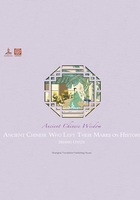
李白 Lǐ Bái (701-762 AD)
The ‘God of Poetry’
Li Bai is widely regarded as one of the greatest romantic poets in the Tang Dynasty (618-907 AD), the golden age of Chinese poetry. He produced more than 1,000 poems during his lifetime and many are still widely enjoyed today.
No wonder, Li Bai has been revered ever since his time as an “immortal” and also the “God of Poetry.”
Li was born in Central Asia to a Chinese family, who had emigrated there to escape political turmoil. When he was four years old, the family returned to Sichuan in southwest China.
When Li reached five, his father began to teach him reading and writing. When he was later sent to a private school, he soon excelled head and shoulders above his classmates. However, he was not hardworking and hated sitting in the classroom all the time.
One day, he sneaked out of the school and wandered to a nearby village. There, he saw an old woman grinding an iron rod on a big grindstone in front of a straw-thatched hut. Being curious, the boy went forward and asked: “What are you doing?”
“Making a needle,” the old woman answered kindly.
“What? Making a needle out of an iron rod?” The boy burst into laughter, thinking the old woman must be crazy.
“Don’t laugh, young man. As long as I keep grinding, I will make a fine needle out of this coarse rod someday.”
The boy suddenly stopped laughing and began to ponder on the meaning of the old woman’s remark. After a while, he bowed deeply to the needle grinder and left quietly.
After that day, the young man became a very diligent student and the image of the old woman grinding an iron rod remained imprinted in his mind for the rest of his life.
Probably due to a link between his family and the political struggle during previous years, Li never sat for the imperial examination, which was deemed then as the only way to pursue a career in the court or to join the social elite. Instead, Li traveled a lot, befriended many renowned scholars and made a name for himself.

Later, however, Li did serve in the imperial court for a brief period as a minor official. But he didn’t enjoy it and he soon left and resumed his travels.
Many of Li’s poems involve the moon and wine, as he was known to be a big wine drinker. And, according to the legend, he eventually died because of the moon and wine.
One of the most famous moon poems written by Li was “On a Quiet Night:”
“Moonlight paints the floor white in front of
my bed,
I wonder whether it’s the hoar-frost instead?
Looking up, I see the bright moon,
Looking down, I suddenly start to miss my
hometown.”
Other lines involving the moon include: “I lift the wine glass to invite the shining moon to join me for the night,” “A bright moon rising above Tianshan Mountain, lost in a vast ocean of clouds,” and “In the moonlight, we loathe to go to bed.”
Li died in 762 AD of illness, and some say it was due to excess drinking. But according to the legend, the God of Poetry drowned when, half drunk, he fell off a boat drifting along the Yangtze River while trying to scoop the moon out of the water.